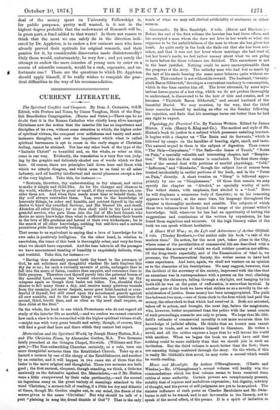CURRENT LITERATURE.
The Spiritual Conflict and Conquest. By Dom J. Castaniza, 0.S.B. Edited, with Preface and Notes, by Canon Vaughan, Monk of the Eng- lish Benedictine Congregation. (Burns and Oates.)—There can be no doubt that it is the Roman Catholics who chiefly keep alive amongst Christians now the notion that the interior life has an importance and discipline of its own, without some attention to which, the higher order of spiritual virtues, the conquest over selfishness and vanity and semi- insincere thoughts, and over the impatience which what is called spiritual barrenness is apt to cause in the early stages of Christian feeling, cannot be attained. Nor has any other book of the type of the "Imitatio Christi" so beautiful and, on the whole, so sober as this, come in our way. Evidently, the translation is a very fine one, judg- ing by the graphic and delicately-shaded use of words which we find here. Of course, there are principles laid down here and there with which we utterly disagree, and which seem to us fatal to all sober industry, and all healthy intellectual and moral pleasures except a few of the very highest. Take this, for instance :— " Restrain, therefore, thy understanding to thy utmost, and strive to make it simple and child-like. As for the changes and chances in the world, whether they be great or small, if they concern thee not, con- sider them not. And when thou needs must hear or behold them let thy will- always contradict them. Yea, even in the knowledge of heavenly things, be sober and humble, and content thyself in the only desire to know thy crucified Saviour, and His blessed life and death. Abandon all other things ; for so thou shalt yield to thy Lord a most grateful service, who puts those into the list of His best friends who desire no more knowledge than what is sufficient to inflame their hearts in the love of His goodness and hatred of their own wickedness ; for in the search of all other knowledge nothing but self-love and a certain pernicious pride lies secretly lurking."
That seems to us equivalent to saying that a love of knowledge for its own sake is positively irriligiou.s. On the other hand, in relation to asceticism, the tenor of this book is thoroughly sober, and very far from what we should have expected. And the tone taken in all the passages we have encountered treating of humility is exquisitely delicate, wise, and truthful. Take this, for instance :—
" Having thus sincerely poured forth thy heart in the presence of God, be not solicitous and thoughtful whether He bath forgiven this thy sin or no ; for such a curiosity savours of pride, endangers thee to fall into the snare of Satan, renders thee unquiet, and consumes time to little purpose. Therefore cast thyself purely into the paternal bosom of thy merciful Lord, resume thy wonted exercises, and take up thy weapons again as though thou hadst not fallen. Yea, shoaldet thou chance to fall many times a day, and receive many grievous wounds from thy enemies, yet never despair, never grow faint-hearted or over- fearful of thyself, but still stand upon thy accustomed guards against all new assaults, and do the same things with no less confidence the second, third, fourth time, and as often as thy need shall require, as thou didst at the first."
On the whole, the book is one which Protestants who de not regard all study of the interior life as morbid,—and we confess we cannot conceive how such a view is to be reconciled with the higher spiritual virtues at all, —might use with very great benefit and safety, though, of course, they will find a good deal here and there Whieh they cannot but reject.






































 Previous page
Previous page